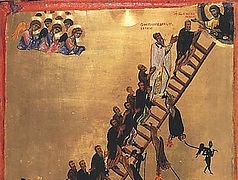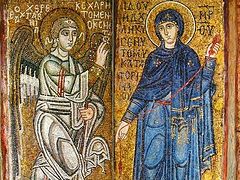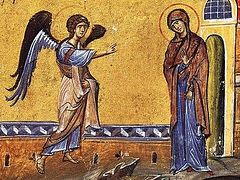In the name of the Father and the Son and the Holy Spirit, Amen.
Today in the Church we celebrate the Great Feast of the Annunciation as well as the Sunday of St. John Climacus, who wrote the spiritual classic The Ladder of Divine Ascent. This is an especially appropriate juxtaposition—there is the ladder of Divine A-scent, which is a detailed guide to overcoming our temptations and our sins and climbing ever closer to Christ, and the Annunciation to the Theotokos, who is the ladder of Divine de-scent. She is the ladder of Divine descent because in her womb God descended from Heaven to earth and entered into His own creation. The Jacob’s ladder passage in Genesis is read at Vespers because the Church sees it as a foreshadowing of the Theotokos by whom God entered the world.
This is the wondrous love and mercy of our God—before He calls us up to Himself, He comes down to us. And this is the uniqueness of Christianity—it is not man searching for God, as are other religions, but rather, it is God searching out man. God has descended to us and become one of us—Jesus Christ. And because He is perfect God, He also perfected human nature, which allows us to seek perfection and climb the ladder of Divine ascent. This is the essence of salvation—this two-way motion—God loves and moves towards us, so that we can love and move towards Him.
But before we reached today’s double commemoration, we have to pass through yesterday’s commemoration—Memorial Saturday. After Christ descended from Heaven to earth, He was crucified and descended from earth into the depths of the earth in Hades—the realm of the dead, where He defeated death and loosed the bonds of the captives—all those who had died from the creation of the world—before rising from the dead and ascending again into Heaven. Christ de-scended before He a-scended, and so this is the pattern of salvation for us—we must descend before we ascend. What this means is that we must descend into the depths of humility before we can ascend into the heights of being like Christ—the heights of theosis.
The All-Powerful God Who created all, humbled Himself to take on human flesh, and He humbled Himself to be betrayed, beaten and crucified. And this is what Lent is all about—humbling ourselves. All the fasting and extra praying we do is for nothing if we don’t do it with love leading to humility. We tend to think highly of ourselves and to be harsh on others. We tend to gloss over our own imperfections, but notice every small fault of our neighbor. But the Orthodox spiritual life says we need to do the exact opposite. By the grace of God we should strive to see only our own sins, and not to judge our brother, as says the Lenten prayer of St. Ephraim.
The truth about ourselves is that we absolutely need God, and we need Him for everything. He gave us life, and we need Him to continue in life—to provide for ourselves and our families, and He gives us the strength to make it through the hard times in life. And we certainly need Him for salvation, since salvation is becoming like Him. We need His grace. Humility is recognizing this truth about ourselves. When we realize that we can do nothing profitable by our own power we will necessarily turn to God in supplication and thanksgiving, and we will develop a relationship with Christ that grows stronger and stronger. And to know Christ is the ultimate purpose and joy of life.
So we’re called to walk down the path of humility—to put others and certainly God before ourselves in all things. And the culmination of our humility is that which we remembered yesterday—our death. Everyone, from Adam until the last man to be born, dies. We have no choice in this matter. We have no power over this inevitable event. We have no power or source of life within ourselves. We only have the life that God allows us to partake of. The Annunciation signals the beginning of our salvation—when the Theotokos said “yes” to God and Christ entered creation—and our death signals the end of our salvation—it is our final descent, before our ascent. After death there is no more opportunity to repent. But, although the departed cannot repent and help themselves, the souls in Paradise and Hades can be helped by us—and that’s why we have Memorial Saturdays. We remember those who have departed because we love them and because we are all part of the one Body of Christ. Nothing can separate or divide the Body of Christ—O death where is thy sting? It is a fundamental part of the Orthodox ethos to pray for the dead. Any version of Christianity that doesn’t believe in praying for the dead is certainly not Orthodox and has a very different spirit from the faith that we proclaim and practice.
After death we enter into a state of expectation. The soul, which separates from the body at death, experiences a foretaste of either the Heaven or Hell that awaits it. But these are not static states—in fact, they are dynamic. Change is possible, and this is why we pray. There is nothing greater that we can do for the departed than to offer the holy Eucharist on their behalf. There is no greater grace than the offering of the Body and Blood of Christ—and this is why the Church dedicates Saturdays, and especially Saturdays in Lent to praying for the departed, and to offering the Eucharist on their behalves. For those souls residing in Paradise, who await Heaven, our prayers increase their joy and only help them move closer to Christ. And for those souls that have been assigned to Hades, our prayers offer some measure of relief to the pain they are experiencing. We naturally want to relieve the pain of those we love. When a child is suffering or in pain, doesn’t his mother do everything she can to comfort and heal him? When we love someone we cannot bear to see them in pain, and this remains the same after our loved ones have departed. Our prayers and the prayers of the Liturgy have the ability to relieve pain after death, and thus it is crucial that we pray for those who have gone on before us. And even more than this—the grace of prayer can literally move a soul from Hades to Paradise—from suffering to bliss. This is absolutely amazing! If anything can inspire us to pray for the dead surely it must be this! Because we are all connected in the one Body of Christ, Christ hears our prayers and pours out His mercy upon the departed, and can even move them into the Paradise of bliss.
Our prayers can help our loved ones to a-scend after they de-scend into the ultimate humility of death. Our prayers can help them to experience a good and joyful end to their salvation. And this is all possible because of the beginning of our salvation which we celebrate today. As we have said, the Annunciation is the beginning of our salvation, and it is the beginning of our salvation because it is the beginning of Christ’s humility. Remember, Christ does not merely look down on us from Heaven and demand us to climb our way up to Him. In His great love for mankind and His great mercy He first comes down to us and makes it possible for us to ascend up the Divine ladder to Him.
Because of His love He is humble. Because of our love we must be humble. One day we will all be humbled in the extreme in our death. If we do not cultivate humility now and it remains foreign to us then the humility of death will be a horror for us. But if we lower ourselves and acquire the humility of Christ in this life, then when we are humbled in dying our soul will be accustomed to it and will embrace the humility as a joy, and will eagerly run to Christ in Paradise. We pray this for ourselves, that after descending into death we may ascend into Heaven when Christ returns, and so we also pray for this for those whom we love who have already departed this life. Always remember the dead whenever you pray, that their humility might be their glory, that their descent might be the passage to their ascent.
Love, and humility, and prayer are the key to salvation for us, and for everyone. May God bless you with a good beginning and end to your salvations, and for the salvation of all.
In the name of the Father and the Son and the Holy Spirit. Amen.




